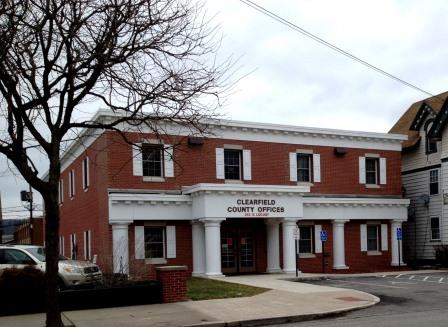CLEARFIELD – At yesterday’s Clearfield County Commissioner’s meeting, an area taxpayer, Roger McCall, accused the county of being “improper” in conducting its private tax sales.
During the public comment period, McCall started off by complimenting the commissioners on spending money on DEVNET tax assessment software. However, he wanted to discuss another idea that would not only increase revenue, but also not increase the county’s expenses.
“It’s free . . . It’s called common sense,” he said. He gave the commissioners “presents,” which were pictures of two homes located at 511 Maple Ave., DuBois. These homes, McCall said, were sold for $4,000 in total by the county’s Tax Claims Bureau.
According to McCall, he and another individual objected to this price and offered a higher sum. At an appeals hearing, he said county officials argued they would rather have $4,000 than the higher sum.
“It’s the appearance of something improper,” he said. “Why wouldn’t you take the highest payable funds?” He said county policy requires them to sell property for an amount that will cover the tax delinquency of a property.
However, he said the county accepted a bid that neither covered the delinquent taxes nor the current year’s taxes. In court, he said the judge permitted the county to sell the properties for any amount, and the county again argued it would rather have $4,000 than $20,000.
These homes, McCall said, have been rented for a total of $1,000 per month. Further, he said they’re for sale for $89,999 and haven’t had any improvements. McCall said, “And, you accepted $4,000, a discount of 95 percent.”
According to him, the homes went for $35,000 at a previous sale, which took place before improvements to the roof, windows and siding. “Common sense in my world says that you have $35,000 plus improvements and $20,000 sitting on the table. That $4,000 isn’t a very good deal for the county, the taxpayers or the other taxing districts.”
McCall told the commissioners that he was disappointed in the county, and it was on their shoulders now. Then, he presented a third picture of a home on North Church Street for which the county has accepted a bid of $1,000. “Why would I file an objection? Why would I go have it abstracted? Why would I pay court costs?” asked McCall. “The county is owed $8,500 and accepted $1,000.”
He asked the commissioners if they planned to continue taking these offers, or if they were going to start serving the taxpayers. He pointed out that Jefferson County doesn’t any longer conduct private tax sales and accused Clearfield County of “going back to its corner” when it has $20,000 to start the bidding process.
Commissioner Joan Robinson-McMillen, chair, asked Solicitor Kim Kesner if he wanted to address McCall. Kesner indicated it was public comment, and he doesn’t have the right to. However, Kesner said he could either address it at her request, or later in the meeting during his own report. Robinson-McMillen asked Kesner to address the matter during public comment.
Kesner described McCall as a “disappointed litigant” who had appeared before Clearfield County President Judge Fredric Ammerman. He said Ammerman had ruled against McCall’s position in court, and his disappointment has escalated into an obsession over the matter.
“And now, Mr. McCall is taking his disappointment out on the commissioners, which is absolutely unreasonable,” said Kesner. He noted that McCall’s position is based upon a lot of misunderstanding with regard to the law.
According to Kesner, Clearfield County, as required by law, has upset sales on an annual basis. If a property isn’t sold at an upset sale, he said it goes onto the private sale list. Kesner said like other counties, Clearfield has decided if a bid is made at a private sale, it will consider and can accept it even if it’s less than the market value of the property and the taxes owed on it.
The county, he said, benefits from this process, as if someone new purchases a property it goes back on the tax rolls. If it remains on the upset or private sale lists, its tax delinquency continues on. Once the county accepts a private sale bid, he said the other taxing districts are given notice and have the right to object.
“It’s for them to decide if the private sale bids are less than they should be, and they have the right to express that,” said Kesner. In this case, he said it went before Ammerman, who has the right to approve or disapprove of the private sale. Kesner said if McCall had a legitimate legal objection to the judge’s decision, he could have appealed it to the Commonwealth Court.
“Instead of doing that, Mr. McCall has decided to argue the processes through the tax claim bureau are inappropriate and have the appearance of impropriety,” he said. “The fact that it was judicially determined prevents any reasonable person from concluding anything improper.”
However, he said there may be room for argument over different processes. He noted that a bill is currently being considered by legislators to bypass upset sales and go to judicial sales, which usually go for less than what taxes are due. He said the county’s Tax Claim Bureau often sells properties for less than what taxes are due.
“The taxing districts don’t complain, because they understand the overall objective,” said Kesner. “There isn’t any impropriety – simply put. Ammerman felt the bid was sufficient. McCall talked back to Ammerman in court, and Ammerman was very firm with his decision.”



